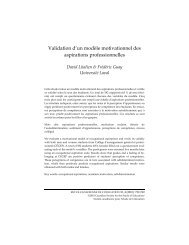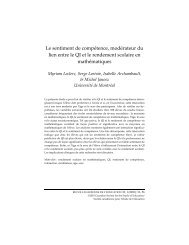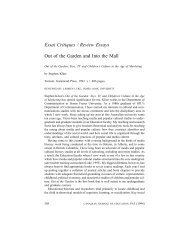Mireille Falardeau et Michel Loranger Le choix de stratégies ... - CSSE
Mireille Falardeau et Michel Loranger Le choix de stratégies ... - CSSE
Mireille Falardeau et Michel Loranger Le choix de stratégies ... - CSSE
You also want an ePaper? Increase the reach of your titles
YUMPU automatically turns print PDFs into web optimized ePapers that Google loves.
MEN AS ELEMENTARY SCHOOL TEACHERS 405<br />
need to be hugged and . . . [males] are not going to be able to hug kids. ...I<br />
hear it expressed as blatantly as that and [I feel] a real resentment. ...Soyou<br />
hear one thing — [men] should be in elementary — then you hear . . . the exact<br />
opposite — kids need to be mothered, they need things men can’t give them.<br />
What is going on here?<br />
Jerry: I was told by a female teacher who had been teaching 13 years that men can’t<br />
teach primary. ...Shesaid men are not willing to run up and wipe a dirty nose<br />
...orlaceaboot...orlocate a lost mitt. She said, “You just won’t make it<br />
there.”<br />
Conceptions of men as unable or unwilling to care for young children (Seifert,<br />
1988) have more than a hint of biological d<strong>et</strong>erminism about them, and run<br />
counter to the men’s conceptions of themselves.<br />
As a Gra<strong>de</strong> 1 teacher, George found that no one really believed he could be<br />
committed to teaching young children:<br />
One reaction I have had from male colleagues ...isthesuggestion that once I g<strong>et</strong> this<br />
year behind me I would like to “move up” . . . and I say, “Oh, no, I’m hoping I’ll be so<br />
good they’ll keep me right here.” . . . I [told them] I had had a chance to take a higher<br />
gra<strong>de</strong> and chose this one. Then they look at [me] as if [I am] making it up.<br />
There is maybe a bit of a sense that it’s right for the women to have the primary<br />
gra<strong>de</strong>s and . . . that [I am] there for a year but [am] not really serious as a primary<br />
teacher and so [they think], “You’ll go, and why don’t you, because you don’t really care<br />
about primary that much.”<br />
At the beginning of the year, George had found the primary teachers “very<br />
supportive,” but even at the end of the year he could “still sense in the staff<br />
room...that they are not compl<strong>et</strong>ely used to [a man in Gra<strong>de</strong> 1]”:<br />
I g<strong>et</strong> the sense that these women are trying to sweep the primary division clean — which<br />
really bothers me because I keep thinking I have done a credible job and they are not<br />
looking at that si<strong>de</strong> of it.<br />
I really think some of them think this has been just a flash in the pan — that the old<br />
boy [the principal] ma<strong>de</strong> a mistake last year. It really hurts because I don’t want to move.<br />
And, George thought he knew why the other primary teachers wanted him to go:<br />
They want [the classrooms] back because that’s the way it was. ...It’stheroom, and<br />
they want the gra<strong>de</strong>. It is very specific what they are after. And they want that kitchen<br />
centre back, too. And those slates over there. ...[Those supplies] came with the room,<br />
but they want them back.<br />
In<strong>de</strong>ed, Acker (1983) has suggested that female primary teachers, having carved<br />
out an area of influence, may “[hold] on to it as one of the few arenas in which








